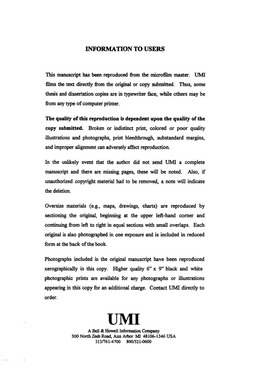| dc.contributor.author | Lackey, James Richard. | en_US |
| dc.date.accessioned | 2013-08-16T12:29:36Z | |
| dc.date.available | 2013-08-16T12:29:36Z | |
| dc.date.issued | 1997 | en_US |
| dc.identifier.uri | https://hdl.handle.net/11244/5465 | |
| dc.description.abstract | These results support Bandura's contention that self-efficacy is malleable and positively related to improvements in performance. The results concerning student goals are more ambiguous. Consistent with Butler's research (1987, 1988), this research indicates a positive relationship among improvements in task involvement, performance, and the number of task specific comments that students' receive. Contrary to Butler's research, I failed to find positive relationships among ego involvement, grades, and the praise that students received. The results and implications of this research are discussed in more detail in the main body of this research. | en_US |
| dc.description.abstract | Finally, I found that, among the types of written feedback, the best predictor of changes in writing performance was the number of task specific comments that the students received. In addition, one way ANOVAs produced similar patterns among teachers on improvements in their students writing performance and the number of task specific comments they gave their students. That is, the teachers who gave the most task specific comments also saw their students writing scores improve the most. | en_US |
| dc.description.abstract | Previous research on student goals (Butler, 1987) indicated that giving students written task specific comments increased their task involvement and performance while giving students a grade or written praise increased their ego involvement and failed to improve their performance. Bandura (1986) had argued that for feedback to alter self-efficacy for a given task, it must alter one's perception of the ability to successfully complete the task. Given these broad based statements, the present research examined the impact of written feedback on goals and self-efficacy, and the impact of goals and self-efficacy on changes in writing performance. | en_US |
| dc.description.abstract | One hundred thirty seven students in a second semester freshman level college English composition class and five second semester graduate assistant teachers participated in this research. Consistent with social learning theory, I found that, among the motivational variables, the best predictor of changes in writing performance was changes in self-efficacy for writing skills. Among the types of written feedback the students received, the best predictor of changes in writing skill self-efficacy was the grades that the students received. While this may seem to indicate a recursive path from grades to self-efficacy to performance to grades and so on, the relationship is not that simple. I further found a weak statistically non-significant correlation between initial writing skill self-efficacy (r = -.1) and writing performance at the beginning of the semester that became somewhat stronger, as well as statistically significant (r =.31) by the end of the semester. This indicates that the students entered the semester with limited knowledge about the writing process or their ability, but by the end of the semester, they began to understand the writing skills targeted by Zimmerman and Bandura (1994), and consequently, their understanding of the writing process, their understanding of their own ability, and their self-efficacy increased. | en_US |
| dc.format.extent | xii, 152 leaves : | en_US |
| dc.subject | Learning, Psychology, of. | en_US |
| dc.subject | Feedback (Psychology) | en_US |
| dc.subject | Education, Language and Literature. | en_US |
| dc.subject | Education, Teacher Training. | en_US |
| dc.subject | Education, Educational Psychology. | en_US |
| dc.title | The relationships among written feedback, motivation, and changes in written performance. | en_US |
| dc.type | Thesis | en_US |
| dc.thesis.degree | Ph.D. | en_US |
| dc.thesis.degreeDiscipline | Department of Educational Psychology | en_US |
| dc.note | Source: Dissertation Abstracts International, Volume: 58-02, Section: A, page: 0384. | en_US |
| ou.identifier | (UMI)AAI9722753 | en_US |
| ou.group | Jeannine Rainbolt College of Education::Department of Educational Psychology | |
